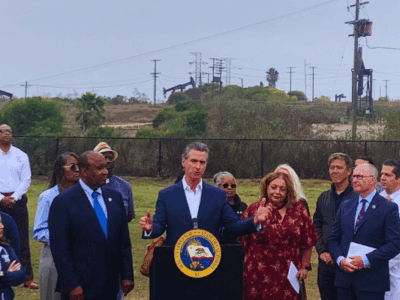Why we have the EPA

Air quality in Beijing over the past week has reached horrifically bad levels. The U.S. Embassy’s air quality tracker went from “Hazardous” to “Beyond Index” on Dec. 4. Check out the depressing details via Treehugger and France 24. It looks like the Great Smog of London from 1952.
England passed its Clan Air Act 4 years later; perhaps it is time for China to rethink its air quality regulation?
And I am still waiting to hear how President Ron Paul would keep Los Angeles from Beijing’s fate without the EPA and the Clean Air Act.
Reader Comments
12 Replies to “Why we have the EPA”
Comments are closed.







The answer to your last question is that Ron Paul would rely on damage suits by property owners. Seriously.
The answer to your last question is that Ron Paul would rely on damage suits by property owners. Seriously.
He might also rely on state governments. It’s not clear whether his objection is regulation per se or whether it is federal regulation. Even libertarians — the vanishingly small number of intelligent ones, anyway — recognize the existence of externalities. For Los Angeles, this might work, but what about New York City, or Philadelphia, or Chicago, or any other metropolitan area that straddles state boundaries. Well, the states will negotiate it out. Sort of like….Durban.
He might also rely on state governments. It’s not clear whether his objection is regulation per se or whether it is federal regulation. Even libertarians — the vanishingly small number of intelligent ones, anyway — recognize the existence of externalities. For Los Angeles, this might work, but what about New York City, or Philadelphia, or Chicago, or any other metropolitan area that straddles state boundaries. Well, the states will negotiate it out. Sort of like….Durban.
I can’t speak for Ron Paul, but I would note that state-level air pollution regulation began well before the feds got into the Act, and the data we have shows that ambient concentrations of the pollutants of greatest concern declined more rapidly before enactment of the Clean Air Act than after. And don’t forget that the primary driver for some federal air pollution measures, such as vehicle emission standards, was to prevent the proliferation of more stringent state measures. Perhaps the real lesson of China is the peril of centralized political control.
I can’t speak for Ron Paul, but I would note that state-level air pollution regulation began well before the feds got into the Act, and the data we have shows that ambient concentrations of the pollutants of greatest concern declined more rapidly before enactment of the Clean Air Act than after. And don’t forget that the primary driver for some federal air pollution measures, such as vehicle emission standards, was to prevent the proliferation of more stringent state measures. Perhaps the real lesson of China is the peril of centralized political control.
No way, jhadler, the bit about concentrations of pollution going away before the CAA, you have to back that up–if you can. It’s probably nonsense. And the bit about state regs being “the primary driver” for federal measures (like what, the 1990 amendments?)–weak at best
No way, jhadler, the bit about concentrations of pollution going away before the CAA, you have to back that up–if you can. It’s probably nonsense. And the bit about state regs being “the primary driver” for federal measures (like what, the 1990 amendments?)–weak at best
Tell the truth, jhadler. Is that you, Tony Blankley?
Tell the truth, jhadler. Is that you, Tony Blankley?
Leaving it up to the State’s is ridiculous – have you been to Florida? Clogged roads with black smoke pouring out of the tailpipes of old diesel trucks. IMO, NOTHING should be left up to Florida…but further re: admissions standards: what about interstate travel? These ‘strict constitutionalists and their infantile beliefs that the founders were infallible are hardly using their own brains – those were guidelines for the times they were written. “Advances’ in technology, but not, unfortunately, in the human mind make this approach look like they driving their cars down the highway at no speed limit and looking in the rear view mirror to see where they are going. Get ’em off the road.
Leaving it up to the State’s is ridiculous – have you been to Florida? Clogged roads with black smoke pouring out of the tailpipes of old diesel trucks. IMO, NOTHING should be left up to Florida…but further re: admissions standards: what about interstate travel? These ‘strict constitutionalists and their infantile beliefs that the founders were infallible are hardly using their own brains – those were guidelines for the times they were written. “Advances’ in technology, but not, unfortunately, in the human mind make this approach look like they driving their cars down the highway at no speed limit and looking in the rear view mirror to see where they are going. Get ’em off the road.